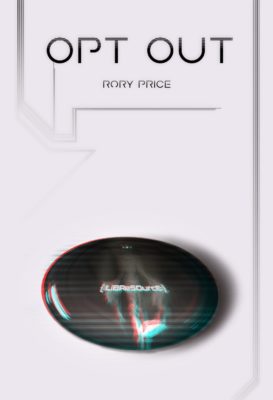
Rory Price recently got in touch with me about his debut novel, Opt Out, a dystopian sci-fi on the dangers of proprietary technology.
Opt Out is set in Canada in a world hooked on Smart Implants. The technology essentially turns people into walking, talking smartphones, and all of their data is saved ‘safely’ to the cloud. The government are even offering to implant the devices into their citizens for free – so I’m sure you can imagine how absolutely safe and fine that is. Not invasive at all.
A story about the digitalisation of human beings, you say? Corruption? General distrust for the government? With Black Mirror vibes? Sign me up.
Opt Out is now available to download from Rory’s website. He releases all of his content under a creative commons license, so his work is free to share – and you can pay what you want/can for it.
Rory has kindly sent over the first chapter, which you can read below. And don’t forget to follow his blog, which has some great posts on why he doesn’t publish through Amazon and his thoughts on literary criticism, which are really insightful.
Chapter 1
Few things worried me as much as the government announcing good news. When major corporations got involved, that made the whole thing all the more worrisome, especially when it came to technology.
The news made the front page and was the first thing I saw as I sat in the subway train. “Government Promises Free Smart Implants for Everyone.” A large picture of Helen Savard, the Canadian minister of technology and innovation, accompanied the article. She was standing with a bald, pudgy man wearing an expensive suit and a tall woman with blond hair tied in a ponytail, probably representatives from Prototek and Nordica. According to the article, both companies agreed to work with the government in providing free implants. A few service providers were also also part of the deal, offering entry-level wireless plans, Teledax chief among them.
“For Christ’s sake, Aaron, drop the newspaper already,” my sister said from the seat next to mine. I frowned as she brushed her dark hair away from her face. “You know everyone’s staring at you, right?”
I looked around, and found a few people observing me with raised eyebrows. Physical newspapers had become a rarity. I often wondered how long news outlets would still bother printing them. They might very well switch to purely digital versions with implants now available to everyone. After all, who would want to read a physical paper when their ocular implants could show them virtual articles carefully chosen by the core implant located at the back of their spine? The woman next to me was doing just that, staring blankly at something in front of her and giggling to herself.
“You know I don’t care what strangers think of me, Rebecca.” I returned my attention to the paper. Truth be told, I could read the news on my tablet, but I enjoyed the feeling of physical paper.
The article mentioned a one billion dollar budget to provide everyone the required surgery and promote the initiative. A free data plan supported by advertisement was mentioned but not explained.
“I can’t believe this.” I slapped the paper with the back of my hand.
“Implants for everyone?” Rebecca said. “About time. People can’t even get a job without them nowadays. It’ll be great for InSight, too. More people with implants means more players for Legends.” InSight Interactive was the company Rebecca worked for as a game designer, and Legends of Akharan, a game she’d spent years creating and improving, surged in popularity by including smart implants in its design, allowing players to trade items in public.
I shook my head. “I understand what you mean but it still worries me. Smart implants are invasive, and we barely know how they work. I don’t think that implanting the entire population with devices that allow corporations to spy through their eyes is a good idea.”
Rebecca rolled her eyes. “It’s just a tool, Aaron. Christ, you’re paranoid.”
“It’s far more than a tool.” I took a deep breath and forced a smile. “But let’s not reopen old arguments. Let’s just find mom’s birthday present and avoid the topic.”
Rebecca fell silent, which I took as a cue to flip through the pages, eventually stumbling upon my picture on page four. A journalist had interviewed me earlier during the week, wanting my opinion on the proposal. The article seemed to capture the gist of my objections, although it did little to truly highlight the risks. “Social Activist Aaron Flynn Warns Against Dangers of Smart Implants,” it read. It went on to explain how giving so much control to a few corporations could pose a significant risk, although it failed to mention any of the examples I provided them. The article ended with a comment from a Prototek executive, one Dolores Gill, reassuring the population that they weren’t in the business of invading their lives.
The train stopped, and a mix of people stepped inside, most of them still half-groggy from the early hour. Two teenage boys flicked their fingers at one another as if throwing invisible darts. One of them grinned as the other threw his arms in the air in frustration.
Rebecca smiled as she pointed at them. “That’s the latest feature we added to Legends. You can duel any random stranger who’s running the game.”
I nodded absentmindedly as I returned my attention to the paper, but there didn’t seem to be anything else on the subject of implants. I skimmed an article about a World War I memorial getting restored.
A tap on my shoulder prompted me to turn around.
A young, dark-skinned woman no older than her mid twenties smiled at me. She wore long, braided hair and carried a backpack. “You’re Aaron Flynn, right?”
I smiled back. “Guilty as charged. Have we met before?”
She shook her head nervously. “I don’t think so. I was at a talk you gave a few years ago about implants and how they’re dangerous. I’ve kind of been a fan ever since.” She grinned as she took her phone—an older Nordica model—out of her pocket. “I run Opentouch on my phone, too.”
“I’m glad you like Opentouch.” It always warmed my heart to see people using the mobile operating system I started and helped develop. “I haven’t given any talks in years though. I’m surprised anyone remembers them.” While warning people about the dangers of proprietary technology and promoting free, open source software used to be the center of my life, I’d since decided to focus my talents on the more practical task of helping businesses adopt said free, open source software.
“So I take it you’re as mad as I am about this government bullshit?” she spat. “Prototek and Nordica are just trying to spy on everyone. Me and some friends are organizing a protest against them.”
“Good luck.” Uncertain how to react, I offered an encouraging smile. As much as I wanted to support her initiative, I wasn’t quite ready to return to my old life. “I take it you don’t use implants at all?”
“Oh hell no. I paid attention when you said that using any of that crap lets corporations spy on everything you do. Apparently, even SenseOS isn’t safe.”
I nodded. “Well, SenseOS is a step in the right direction. It’s not perfect, but if you care about software freedom, it’s better than Kiva or Virtuoso.”
While SenseOS was free software—its source code was free for everyone to modify and redistribute—the implants themselves still used proprietary firmware, meaning Nordica could potentially use hidden backdoors to remotely access the devices. This alternative operating system could essentially be installed on most Nordica implants, replacing the default system, Kiva. By my estimate, SenseOS replaced about seventy percent of Nordica’s code with open code that could be reviewed or modified by its users.
“But would you say it’s okay to use it?” she asked.
I shrugged. “It’s better than using the base system.” I paused. “I don’t think you told me your name?”
“Oh, sorry.” She extended a hand. “I’m Susan.” I shook her offered hand. “So, can we count on your support for the protest?”
I forced a smile. “I’ll see if my schedule allows it, but I’ll definitely write something about it on my blog. Send me an email. My address should be on the Libresource website.”
“Thanks, I’ll keep in touch.”
Rebecca shook her head as Susan walked away. “You never stop, do you?”
“Like it or not, I’m still somewhat relevant in this movement,” I said. “Smart implants aren’t as safe as people think. I just want them to know there’re other options, that’s it.”
The train came to a stop. “Let’s just go buy Mom a gift,” Rebecca said. She stood up and walked toward the exit.
Rebecca had been staring at a display full of Nordica gift cards for the past minute, scratching her head. She picked one and fiddled with it, spinning it between her fingers.
“Go ahead if you want to buy it,” I said. “But you know how I feel about you giving Mom anything implant-related. If you still want us to get her something together, it should probably be more meaningful than that.” I looked around, trying to find an alternative, but nothing caught my eye.
“Don’t worry,” She returned the card to its place. “I was just thinking of adding it as an extra gift from me.”
I sighed. “This might be her last birthday where she still recognizes us. Another reason why we should get her something more meaningful than a gift card.”
She shook her head. “Don’t be so dramatic, Aaron. You know very well that her Precious Moments app lets her record anything important.”
I groaned. “Recordings and memories aren’t the same thing.”
Rebecca rolled her eyes. “I know that, but this is Mom’s life we’re talking about. At least she has something.”
“I’m not denying that the concept has merit,” I pointed out, “but she just handed over her entire life to Nordica so you can pretend she’s still lucid. Recordings stored on some server don’t constitute real memories, and you know it.”
Rebecca recoiled.
I took a deep breath, realizing what I’d just said. “I’m sorry, but you know how I feel about it. Can’t we just get our picture taken together? That way it’ll at least look like we’re a united family.”
She eyed me up and down. “Fine, but lose the jacket. It wouldn’t have hurt for you to shave, either.” She waved her hand in front of her eyes, which took on a too-familiar blue glimmer. “The photographer’s available in ten minutes. I just made a reservation.”
I looked at my old jacket. It was a relic from the seventies, brown with leather patches on the elbows. “Alright, no jacket,” I relented. “But there’s no way I’m getting rid of the beard.” I’d grown it a few years ago, at about the same time I developed a noticeable balding spot on the back of my head. While I kept my facial hair short, I couldn’t see myself without it.
“Okay, let’s do it,” she led the way toward the mall’s photographer.
We were photographed mere moments after meeting the photographer. Rebecca and I then went our separate ways. She headed for InSight’s studio downtown, while I made my way to Libresource, in the heart of Verdun. A quick metro ride got me there only an hour and a half late.
I entered the nondescript brick office building and climbed the stairs, heading for the windowless brown door sporting Libresource’s logo. It wasn’t a large office, sandwiched between a graphic design company and a currently empty office space being used for storage by the building owner.
Joey was the first to welcome me as I arrived in the modest room that served as Libresource’s headquarters. The place was small but cozy. Four desks occupied the room, with Joey and I on the left, Taylor, our full-time developer, on the right, and another currently empty desk next to his. Most of the furniture had been donated or bought used, which made the office seem more like a living room than a work environment. We’d built all our computers ourselves using the work station at the back of the office next to the large window, where our engineer, Sophie, usually worked. It wasn’t much, but it gave me the support I needed for my work as a tech consultant.
“I take it you saw the news?” Joey said. The glimmer in his eyes so common with ocular implants always unsettled me. It gave his eyes a blueish tinge that clashed with his dark skin.
“I have, not that we didn’t expect it.” I hesitated and shook my head. “My sister was ecstatic about it.”
“That must have been fun.” Taylor kept staring at his monitor from his workstation in front of my desk as he spoke, munching on a breakfast burrito. Bits of eggs stuck in his beard.
“Never mind Rebecca,” I said as I sat on the old brown couch we kept near the entrance. “Either way, Taylor. Any news on the Westside Brewery front?”
He grinned at me. “Oh yeah, we hit the jackpot. I found a guy in Switzerland who runs his own brewery and made the exact module we’re looking for. All his code’s open, so I spent the whole evening going through it yesterday. He told me he got all his recipes in his module, and it translates to ingredients used, how much it’ll cost, everything.”
I leaned forward. “Good. At least we got some good news today. Did you try integrating it with Westside’s system?”
“Yup. I ran into a few hiccups, but I’ve been chatting with Paul—the guy from Switzerland—and he’s been helping me out. I think he’ll even use some of my code on his end.”
“Good work, Taylor.”
Joey waved his hand in front of his face, and his implants turned off, his eyes returning to their natural brown. “I just hope that mass implantation doesn’t hurt business. Still, I imagine you’ll want to release a statement.”
I stood up. “I’ve been thinking about it the entire way to the office. We knew it would happen sooner or later. I suppose we’ll just have to keep telling our customers they have the right not to use implants, and if that fails, make sure SenseOS is offered as a compromise.”
“Like Prototek will let that happen,” Taylor said. “They’ve been sucking the government’s dicks for months. You know they won’t let go once they have everyone implanted. They’ll just keep giving us all a good ass ramming.” He raised his fist in an obscene gesture.
“I didn’t need this image so early in the day, Taylor,” I said, shaking my head. I moved to my desk, next to Joey’s.
I opened my email inbox and found it overflowing with questions from concerned free software users worried about their school or workplace pressuring them to get implants. As much as I tried to focus my effort on my consulting work, activism wasn’t something I could just ignore completely. I clicked on the first email, which came from Susan, the woman I’d met in the metro earlier.
“Oh, Aaron,” Joey said as I read Susan’s email. He waited for me to turn away from my monitor before continuing. “I’ll need Friday off in two weeks. I have an appointment at the clinic.”
“Hormones again?” Taylor asked with his mouth full.
“Maybe,” Joey said. “It’s just the usual tests, but they might have to readjust something.” He scratched his chin. “Maybe I’ll be able to grow a beard eventually.”
“We can manage without you for a day,” I said. “You’re not having problems with your transition, are you?”
Joey shook his head and chuckled. “Nah, it’s just a routine thing. Nothing to worry about.”
“Good,” I said. “For now, we should figure out what we’re going to do about this announcement.” I leaned toward Joey. “Do you think you could get me an appearance somewhere? People will be expecting it, and the visibility wouldn’t hurt.”
“Plus, you know, let people know that the whole thing’s a scam,” Taylor said, his eyes still locked on his monitor. He clicked his mouse a few times. “When companies like that give you shit for free, you’re usually the product.”
“And that’s what I want to talk about,” I said. “People need to know that implants still come with a price. They need to know about their options, but also that SenseOS might not be perfect. Business owners who might be afraid should know that they can come to us for answers.”
Joey shrugged. “SenseOS is good enough. I mean, yeah, theoretically the government could have remote access to my implants, but why would they care about me? It’s not like any of us can live in a cave.”
Taylor took another bite from his burrito. “It would freak me out if some dickhead at Nordica could watch me jack off from my own eyes. I dunno how you do it, Joey.”
“They probably have better things to do,” I said. “No offense, Taylor, but I can’t imagine anyone wanting to watch whatever it is you do in your private time.”
“Besides, most of the spying is done through apps,” Joey said. “The worst features aren’t even supported on SenseOS.”
“Except for the ocular drivers,” Taylor said, counting with his fingers. “And the proprietary wireless chip, and the money chip, and the neural connections—”
“I get it,” Joey said with a light chuckle. He shook his head. “Doesn’t change that you two would be out of a job if I couldn’t find you customers, and how am I gonna get them? Email? We’re not in 2018 anymore.”
I scratched my chin. “You know, I never thought about it that way. I hope you didn’t get implants just on our account.”
Joey raised an eyebrow. “I got them for the weather app.” He chuckled again. “Seriously, it’s not as bad as you guys think. It’s just a tool I use to get on the Internet, message people, take pictures. Yeah, there are abusive apps out there. I just try to be smart about how I use my implants.”
“I’m sure they’re convenient,” I shook my head. “I just don’t think I’d be comfortable giving any technology so much power over me. It’s not even a question of how open the code is, to be honest. Anything can be exploited.”
“Now you’re beginning to sound like Taylor,” Joey said.
“He’s still right,” Taylor said.
I waved my hand dismissively. “Either way, we should all get back to work. I’ll start writing our response for the blog, and link to the SenseOS installation guide. Joey, you’ll probably have your work cut out for you. Try to get me an interview or two, whatever you think will help. Taylor, are you still working on the Westside project?”
“Yeah. You told me they were a priority client, so I’m sticking with them. Really, all I have left to do is make sure all of Westside’s recipes integrate properly with Paul’s module. I can switch to SenseOS for a few days if you want.”
I shook my head. “No. SenseOS has their own team, and they’re not lacking for contributors. We can’t lose track of our clients; they’re the priority. I imagine Sophie’s still at Westside today?”
“Setting up touchscreens next to their machines, yeah. She said she’ll be done in two days.”
“That’s fine,” I said. “She told me she might have a lead on buying one of the new implant models though, and she’s been asking if she can work on it.”
“That’d be great,” Taylor said, glancing up from his monitor.
I frowned. “I’m not sure if I can spare her for a project like that. Maybe if we had someone else who knows their way around implants.”
Joey whistled and shook his head. “Not with our current revenue, sorry. Unless you find someone willing to do it pro-bono.”
I scratched my chin. “Put out a message. It’s doubtful we’ll find anyone, but maybe there’s an activist out there willing to come here a few hours a week. If Sophie really can find the latest hardware, reverse-engineering it would be significant.” I took a deep breath and forced an uneasy smile. “It has been a while since we reversed-engineered anything.”
Joey turned back to his computer. “Nothing to lose, I guess. I’ll get right on it.”
Most of the day was spent answering emails and forum posts. From worried free software supporters, to would-be activists, to concerned clients, I found little time to get actual work done. I wrote a blog post explaining that no one should be forced to use any one piece of technology, be it for ideological, religious, or security reasons. I mentioned how I’d developed Opentouch a decade ago so people could still use older phones and tablets, even after official support ended and manufacturers pressured users to switch to implants. I also linked the SenseOS website and explained various ways in which people could contribute to the project, such as finding bugs or writing documentation.
The SenseOS forums bustled with activity, mostly consisting of people asking if SenseOS would really block advertisement, seeing it as nothing more than Nordica’s Kiva system with ad-blocking features. I frowned at the multiple guides explaining how to install SenseOS and then re-enable the connection to Nordica’s servers. Even though the SenseOS developers refused to support proprietary software, an app had been written by a different group to bridge Nordica accounts to SenseOS. I had once written an article advising against it, but to little avail.
I leaned back on my chair and massaged my temples. “Bunch of idiots,” I mumbled under my breath. As much as people had the right to choose, so many missing the point in such a way was a strain on my patience.
Taylor’s chuckle brought me back to reality. “Man, you look like you spent too much time on the SenseOS forums.”
“I just saw another flamewar about adding support for proprietary apps on the wiki.” I shook my head. “I wish I could just forget about this implant business and get something done. Can’t people just not get implants and go on with their lives?”
Joey smiled sheepishly. “You know it’s not that simple.”
“I know,” I said as I closed the browser tab.
“For the record,” he continued without looking at me. He moved both hands in front of his eyes. “You don’t have to get involved in the protest movement. If I remember properly, you started Libresource because you wanted to get away from activism and build something more concrete.”
“Actually, I started Libresource to legitimize my activism and facilitate Opentouch development. You’re the one who talked me into focusing on business.” I forced a smile. “But you’re right. I shouldn’t let it get to me. Things will calm down eventually once people realize they’re not forced to do anything.”
“Yeah right,” Taylor said with a scoff.
I frowned. “Not now, Taylor.”
Joey raised a finger. “Hold on, I got a message.” He flipped his right index in front of his face, then grinned at me after a few seconds. “All right, Aaron, I got the jackpot. They want you on Tracy Tonight.”
I blinked. “Seriously? Will it be just me?”
“Sorry, no. They want you to debate with representatives from Teledax and Prototek.” He moved his finger upwards, probably reading a message. “Between you and me, I think they’re looking for controversy, but exposure is exposure, and you know how popular Tracy Tonight is.”
“You don’t have to convince me,” I said. “I’ll take it. It’s not like it’ll be my first rough interview. Any idea when they want me on?”
“Two days,” Joey said. “It doesn’t give you a lot of time to prepare. I do have the names of the people you’ll appear with.” He moved his finger up and down, no doubt browsing on his implants. “Here we go. Simon Brodeur, the president of Teledax, and Dolores Gill, VP of public relations for Prototek.”
“Noted,” I said as I stood and patted him on the shoulder. “Good work.”

About the author
Rory Price is a writer of science fiction. He started out writing character backstories for tabletop gaming and quickly got into writing his own campaigns. Eventually he moved on to fanfiction, but he felt the urge to create his own characters and settings. His first novel, Opt Out, is now available on his website: https://roryprice.net



Leave a Reply